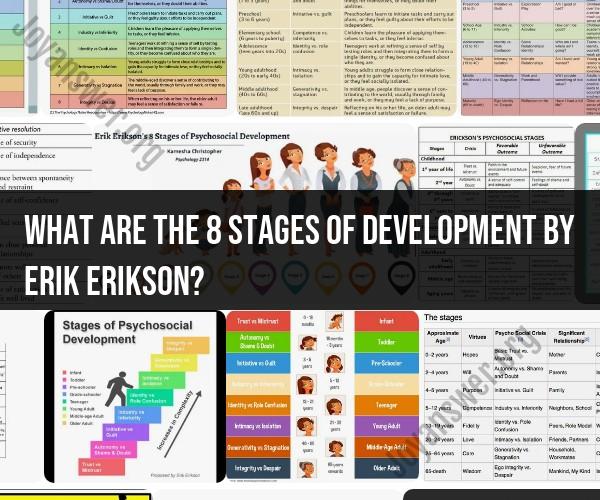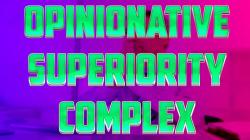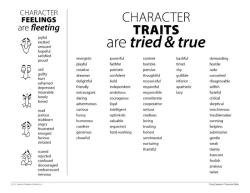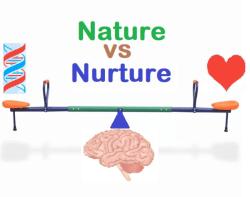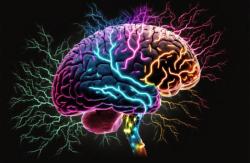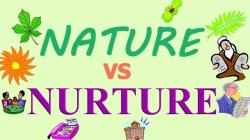What are the 8 stages of development by Erik Erikson?
Erik Erikson's theory of psychosocial development outlines eight stages of human development, each characterized by a unique psychological crisis or conflict. These stages span from infancy through late adulthood and encompass the challenges individuals face as they grow and mature. Here are the eight stages of Erikson's psychosocial development:
Trust vs. Mistrust (Infancy, 0-1 year):
- The first stage occurs during infancy, where the central challenge is establishing a sense of trust in the world. Infants learn to trust their caregivers and develop a sense of security when their basic needs, such as food, warmth, and comfort, are consistently met. Failure to develop trust may lead to feelings of mistrust and insecurity.
Autonomy vs. Shame and Doubt (Early Childhood, 1-3 years):
- In the toddler years, children begin to assert their independence and explore their surroundings. Success in this stage involves developing a sense of autonomy and self-control. However, excessive criticism or punishment can lead to feelings of shame and doubt.
Initiative vs. Guilt (Preschool, 3-6 years):
- During the preschool years, children start to take on more responsibilities and engage in imaginative play. They learn to initiate activities and develop a sense of purpose. Overly harsh criticism or restrictions can result in feelings of guilt and anxiety.
Industry vs. Inferiority (Elementary School, 6-11 years):
- This stage occurs during middle childhood, where children become more focused on achieving competence in various skills and activities, such as academics and sports. Success leads to a sense of industry and accomplishment, while feelings of inadequacy and inferiority can emerge with repeated failures.
Identity vs. Role Confusion (Adolescence, 12-18 years):
- Adolescents grapple with issues related to identity and self-concept. They explore their values, beliefs, and life goals, seeking to establish a clear sense of identity. Failure to do so can result in role confusion and an unclear self-identity.
Intimacy vs. Isolation (Young Adulthood, 19-40 years):
- In early adulthood, individuals focus on forming close and meaningful relationships with others. They seek intimacy and connection in friendships and romantic partnerships. Failure to establish intimacy can lead to social isolation and a sense of loneliness.
Generativity vs. Stagnation (Middle Adulthood, 40-65 years):
- Middle-aged adults consider their impact on the world and future generations. They strive to contribute positively to society, whether through raising children, pursuing meaningful careers, or engaging in community activities. Failure to do so may result in feelings of stagnation and unfulfillment.
Ego Integrity vs. Despair (Late Adulthood, 65+ years):
- In late adulthood, individuals reflect on their lives and the choices they've made. Those who feel a sense of accomplishment and integrity develop a feeling of wisdom and acceptance of the life they've lived. Conversely, those who harbor regrets and unresolved conflicts may experience despair and a sense of futility.
Erikson's theory emphasizes the importance of successfully resolving each psychosocial crisis at each stage to achieve a healthy and balanced personality development. It acknowledges that development is a lifelong process, and individuals continually confront these challenges as they progress through life.
Erik Erikson's Eight Stages of Human Development: An Overview
Erik Erikson's theory of psychosocial development is a stage theory that describes the development of human personality and social interaction across the lifespan. Erikson believed that personality develops in a series of eight stages, each of which is characterized by a specific conflict or challenge. The successful resolution of each conflict leads to the development of a particular psychosocial virtue.
Here is a brief overview of Erikson's eight stages of psychosocial development:
- Stage 1: Trust vs. Mistrust (0-2 years)
During this stage, infants develop a sense of trust or mistrust in the world around them, based on the quality of their interactions with their caregivers. If infants experience reliable and responsive care, they will develop a basic sense of trust in the world. If they experience inconsistent or unresponsive care, they may develop a sense of mistrust.
- Stage 2: Autonomy vs. Shame and Doubt (2-3 years)
During this stage, toddlers develop a sense of autonomy or shame and doubt, as they begin to assert their independence and explore their environment. If toddlers are given the opportunity to explore and make their own choices, they will develop a sense of autonomy. If they are criticized or punished excessively, they may develop a sense of shame and doubt.
- Stage 3: Initiative vs. Guilt (3-6 years)
During this stage, preschoolers develop a sense of initiative or guilt, as they begin to explore their own abilities and take on new challenges. If preschoolers are encouraged to explore and try new things, they will develop a sense of initiative. If they are discouraged or punished for making mistakes, they may develop a sense of guilt.
- Stage 4: Industry vs. Inferiority (6-12 years)
During this stage, school-aged children develop a sense of industry or inferiority, as they begin to learn new skills and compare themselves to their peers. If children are successful in their schoolwork and extracurricular activities, they will develop a sense of industry. If they experience repeated failure, they may develop a sense of inferiority.
- Stage 5: Identity vs. Role Confusion (12-18 years)
During this stage, adolescents develop a sense of identity or role confusion, as they explore their values, interests, and goals for the future. If adolescents are able to successfully explore and integrate their different identities, they will develop a strong sense of self. If they are unable to do so, they may experience role confusion.
- Stage 6: Intimacy vs. Isolation (18-40 years)
During this stage, young adults develop a sense of intimacy or isolation, as they form close relationships with others. If young adults are able to form close and committed relationships, they will develop a sense of intimacy. If they are unable to form close relationships, they may experience isolation.
- Stage 7: Generativity vs. Stagnation (40-65 years)
During this stage, middle-aged adults develop a sense of generativity or stagnation, as they focus on their careers, raising families, and contributing to their communities. If middle-aged adults are able to make meaningful contributions to their work and relationships, they will develop a sense of generativity. If they are unable to do so, they may experience stagnation.
- Stage 8: Integrity vs. Despair (65+ years)
During this stage, older adults develop a sense of integrity or despair, as they reflect on their lives and come to terms with their mortality. If older adults are able to look back on their lives with satisfaction and acceptance, they will develop a sense of integrity. If they are unable to do so, they may experience despair.
Navigating Life's Developmental Phases: Erikson's 8 Stages Explained
Erikson's theory of psychosocial development is a valuable tool for understanding the different stages of human development and the challenges and opportunities that each stage presents. By understanding Erikson's eight stages, we can better support ourselves and others as we navigate the different phases of life.
Understanding Psychosocial Development: Erik Erikson's Framework
Erikson's theory of psychosocial development is a holistic approach to understanding human development that takes into account both the biological and social factors that influence personality development. Erikson believed that personality develops in a series of eight stages, each of which is characterized by a specific conflict or challenge. The successful resolution of each conflict leads to the development of a particular psychosocial virtue.
Erikson's theory has been influential in many fields, including psychology, education, and social work. It is a valuable tool for understanding how people develop and change throughout their lives.
